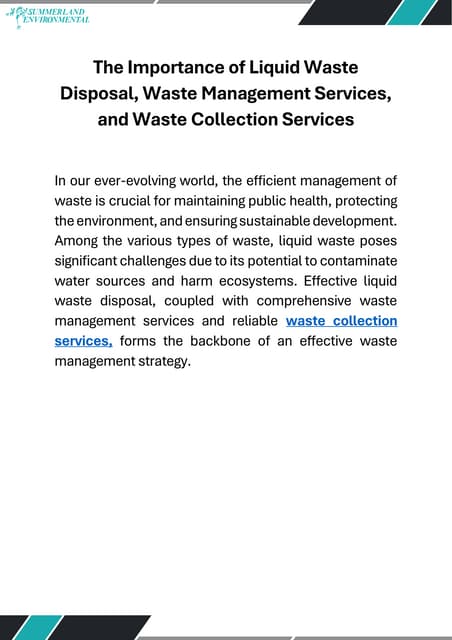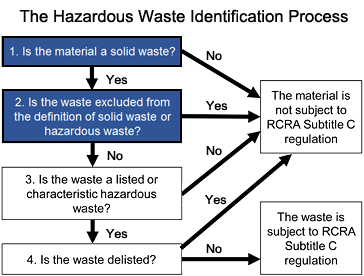Reclaim Waste Things To Know Before You Get This
Reclaim Waste Things To Know Before You Get This
Blog Article
Getting The Reclaim Waste To Work
Table of ContentsRumored Buzz on Reclaim WasteAll About Reclaim WasteSome Ideas on Reclaim Waste You Need To Know7 Easy Facts About Reclaim Waste ExplainedReclaim Waste for Dummies
Check out the types, incidents, and kinds of fluid waste. Domestic sewer waste refers to the waste and products from a residential septic system. This sort of waste is created by people in houses, institutions, and other structures. This only includes septic containers that have a drain area. The correct management and disposal of residential sewage waste call for liquid waste to be transferred to a sewer therapy plant where the proper approaches and equipment are put on cleanse and dispose of waste.
Industrial waste often includes potential threats, such as combustible products or a blend of fluid and strong waste items, and needs an advanced and thorough disposal procedure. The disposal of industrial waste commonly entails the purification of waste prior to transportation to guarantee secure and proper disposal. Hazardous waste is produced from by-products and drainage of commercial procedures and manufacturing.
This kind of waste can not use the exact same sewage management transportation or procedures as septic or commercial liquids. The industrial waste management procedure calls for the assessment and testing of liquid waste before it undergoes the disposal procedure (industrial wastewater treatment). Drainage waste is the fluid waste that comes from drainage and excess stormwater in highly populated areas or cities
Runoff waste can create contamination and flooding otherwise dealt with appropriately. Learn extra concerning sewage system cleaning and waste administration. Guaranteeing correct waste management can protect against catastrophes and minimize ecological damage. Both people in residential settings and professionals in industrial or production markets can gain from comprehending the processes and policies of liquid waste management.
The smart Trick of Reclaim Waste That Nobody is Discussing
Contact PROS Services today to find out about our waste monitoring and disposal services and the appropriate means to look after the liquid waste you generate.
(https://hub.docker.com/u/reclaimwaste1?_gl=1*1980ev1*_ga*MTgwOTc3Nzc2OS4xNzMxMzI1Mzkw*_ga_XJWPQMJYHQ*MTczMTMyNTM5MC4xLjEuMTczMTMyNTcwOC4xMC4wLjA.)Do you know what happens to your water when you draw the plug, flush the toilet or drain the washing maker? No? Well, it's worth understanding. This supposed 'wastewater' is not only a crucial resource but, after therapy, will be launched to our land, waterways or the ocean. Utilized water from bathrooms, showers, baths, cooking area sinks, laundries and industrial procedures is called wastewater.

water made use of to cool machinery or tidy plant and tools). Stormwater, a kind of wastewater, is drainage that moves from farming and metropolitan areas such as roofings, parks, yards, roads, courses and rain gutters into stormwater drains pipes, after rain. Stormwater moves neglected directly to regional creeks or rivers, at some point reaching the ocean.
The 8-Minute Rule for Reclaim Waste
In Queensland, the majority of wastewater is dealt with at sewer treatment plants. Wastewater is moved from residential or commercial sites through see post a system of sewers and pump terminals, referred to as sewerage reticulation, to a sewer therapy plant. Neighborhood governments construct, maintain and run most sewer treatment plants. Operators are accredited under the Environmental Management Act 1994 to release treated wastewater at an appropriate ecological criterion into waterways.
The Department of Natural Resources suggests regional governments about handling, operating and keeping sewerage systems and treatment plants. In unsewered areas, city governments may need owners to install individual or household sewage therapy systems to deal with domestic wastewater from bathrooms, kitchen areas, shower rooms and laundries. The Division of Natural Resources authorizes making use of home systems when they are proven to be reliable.
In some new subdivisions, treatment of some stormwater to eliminate litter, sand and crushed rock has begun utilizing gross pollutant catches. Wastewater therapy happens in four stages: Removes solid matter.
Wastewater after that moves right into large tanks where solids clear up and are gotten rid of as sludge. Oil and scum are skimmed from the surface area. Makes use of tiny living organisms knows as micro-organisms to break down and remove staying dissolved wastes and fine fragments. Micro-organisms and wastes are included in the sludge. Gets rid of nitrogen and phosphorus nutrients that might trigger algal blossoms in our rivers and endanger aquatic life.
Some Of Reclaim Waste
Nutrient elimination is not offered at all sewer treatment plants since it needs expensive specialised devices. It is ending up being extra usual in Queensland. Clear liquid effluent created after treatment might still have disease-causing micro-organisms. If this effluent is launched into waterways such as rivers or the sea, the micro-organisms will at some point pass away out.

This generally means wastewater has to be dealt with or contaminants gotten rid of before it can be discharged to rivers. The majority of wastewater flows right into the sewerage system. Under the Act, city governments administer approvals and licences for environmentally pertinent activities (Ages) involving wastewater releases that might have a neighborhood effect. The division carries out approvals and permits to Periods including wastewater releases that might have a regional or statewide impact.
The Ultimate Guide To Reclaim Waste
Monitoring gives accurate info regarding water top quality and can validate that permit conditions are being satisfied. The information acquired via tracking offers the basis for making water high quality choices.
Report this page